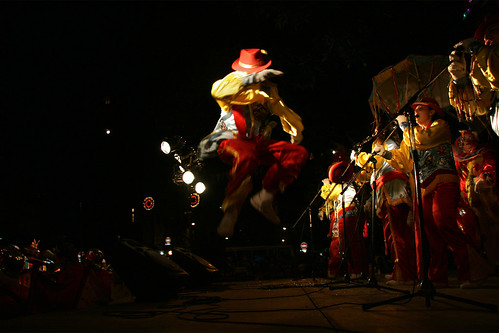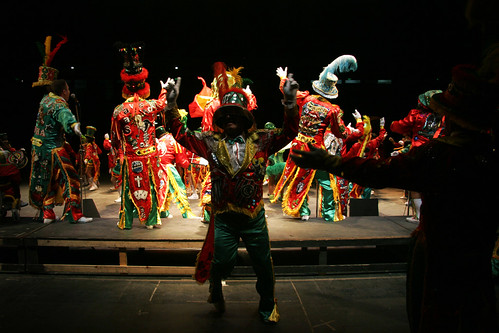Talking about carnival in other Latin American countries is as ordinary as discussing politics, salsa and rumba, but in Argentina for many years carnival belonged to the past. In June 1976, during the military dictatorship, carnival as a holiday was removed from the schedule of non-working days by law no. 21329. The law was modified last year, and this year Argentina celebrated carnival with March 7 and 8 as holidays.
Due to the 1976 prohibition, many traditions were lost: Gone were the holidays, neighborhood parades, throwing water at those who passed by on the street or the famous water balloons and the buckets full of water. Nevertheless, many cities around the country held carnival celebrations such as Gualeguaychú [es], Corrientes [es], Salta and Humahuaca [es], among others. Buenos Aires did not lose the tradition and continued the “murgas,” or what is commonly known as “comparsas” (carnival street bands) in other countries. But Argentina still did not have a date –official non-working days– to immortalize the festivities.
In 1983, with the return of democracy to Argentina, the famous Argentine murgas [es] began to reappear, but the carnival holidays remained largely unimplemented.
In November 2010, President Cristina Fernandez de Kirchner amended law 21,329 and the the joy returned, especially to those who fought for the restoration of the carnival festivities, like the MURGAS Association [es] which achieved their goal after fourteen protests:
Después de 27 años en democracia y tras 14 multitudinarias marchas carnavaleras que las murgas realizamos año tras año en reclamo de la restitución del feriado nacional de lunes y martes de carnaval, logramos un hecho histórico, sin precedentes y de una profunda y enorme alegría: volver a tener los feriados de carnaval
Blogs like La república de las palabras [es] (The Republic of words) expressed their joy about the return of the Carnival holidays. Many newspapers in Latin America, like Ecuador's El Comercio [es], Guatemala's Prensa Libre [es], and Bolivia's El Deber announced the comeback.
If we consider that 35 years had passed since the elimination of the Carnival holidays, this means that many generations do not know the meaning of the festivity, or the cause of such joy and celebration. Or maybe they thought that to experience the carnival you have to go to Brazil. Perla A. in her personal blog writes about the generational experiences where the youth learn about the festivity through stories told by their parents or grandparents:
Todos lo que tenemos entre 30 y 40 años hemos crecido con los relatos de los carnavales de nuestros padres, de los disfraces que usaban y de la atmósfera festiva que se vivía, no en vano una canción dice: por esos cuatro días locos que vamos a vivir, en clara referencia a este festividad.
That is why during the long weekend many people took the opportunity to travel. The hotel capacity was filled up by more than 80% by national tourists enjoying a short vacation. Now there will surely be evaluations of whether the decision to have this new holiday was a good or bad idea, especially because this is an election year; but at first glance, considering the traffic of tourists during the holiday, there are not negative opinions. The Argentine Carnival is once again an official holiday.









2 comments
Carnivals are held everywhere in the world but I may say that we have a great selection of carnivals here in Asia too. An example is Loi Krathong, Sukhothai, Thailand where in Thai people create little ships made from greens to ask for apology to the Mother of the Waters. For details, visit http://www.pathtoasia.com/jobs. “We help Americans find jobs and prosperity in Asia. “